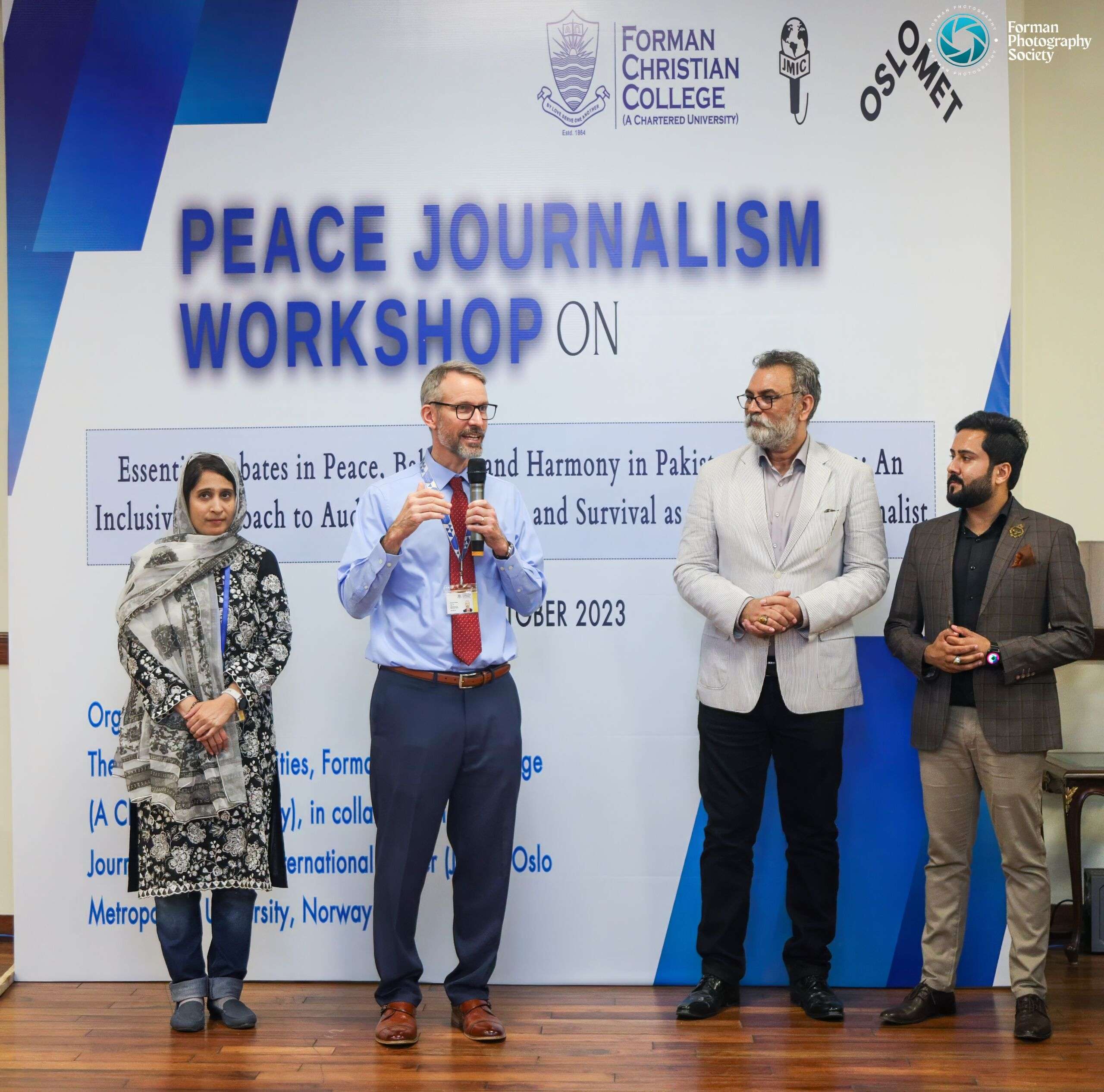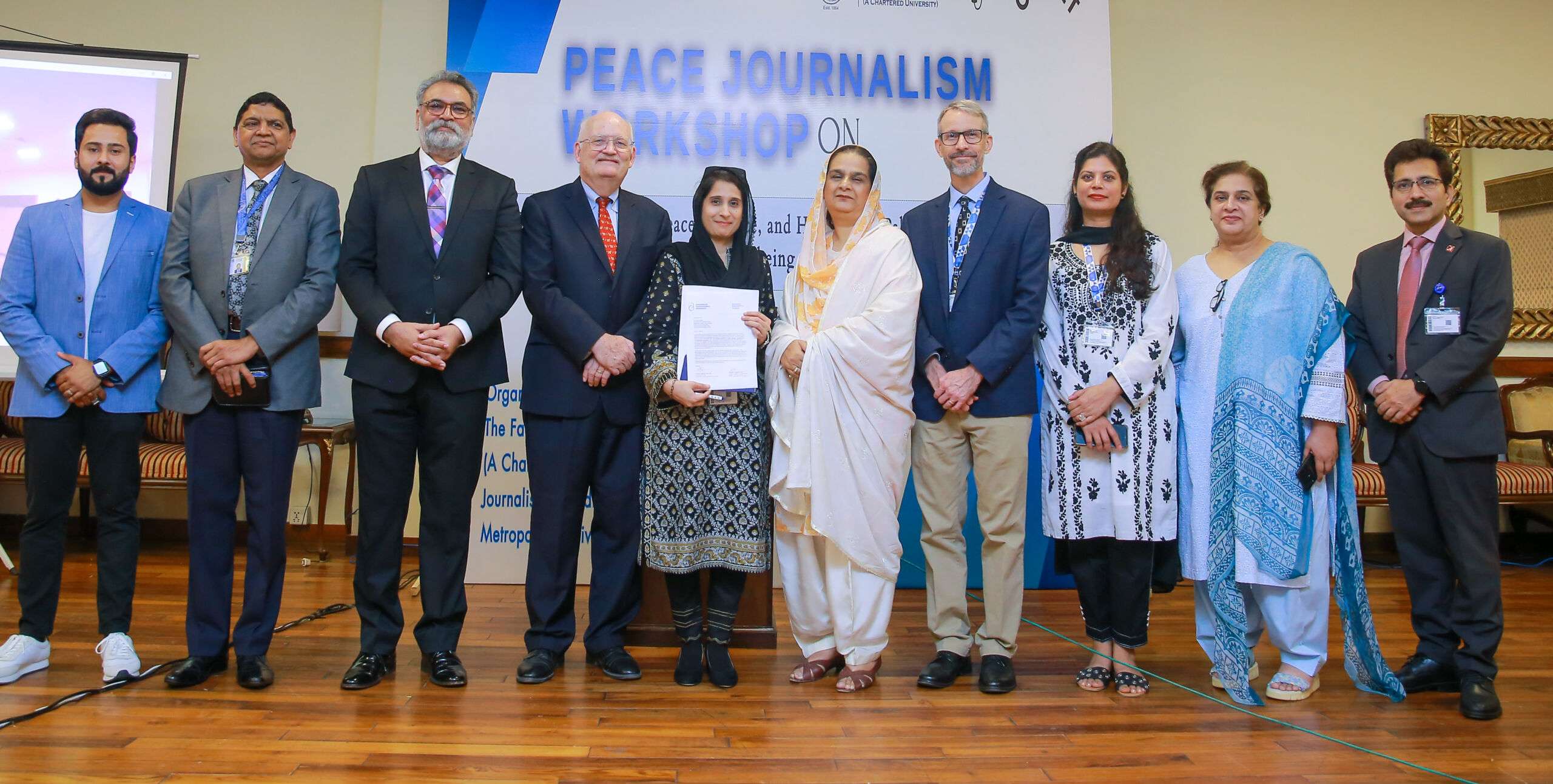Faculty of Humanities, FCCU hosts Peace Journalism Workshop

The Faculty of Humanities, Forman Christian College (A Chartered University), in collaboration with Journalism & Media International Center (JMIC), OsloMet – Oslo Metropolitan University, Norway, hosted a three-day “Peace Journalism Workshop” from 24th to 26th October 2023 on essential debates in peace, balance and harmony in Pakistani journalism: an inclusive approach to audience wellbeing and survival as a mainstream journalist. The workshop was attended by various academicians, postgraduate students, and journalists from all over Pakistan. It was moderated by Mr Syed M. Saqib, Assistant Professor of Mass Communication. Dr. Altaf Ullah Khan, Dean of Humanities at FCCU inaugurated the workshop and gave a keynote speech which was followed by a signing of an MOU for the ICA Regional Conference on Climate Communication by Dr Firasat Jabeen, Chairperson, Department of Mass Communication.
Rector, FCCU, Jonathan Addleton and Vice Rector, Dr Trimble, addressed the participants and shared their excitement for the Peace Journalism Workshop and the partnership with JMIC.
The inaugural was also attended by the Associate Vice Rector, Dr Gloria, Registrar, Brig Dr Nayyer, Chief Marketing and Outreach Officer, Ms Badia and faculty members from the Department of Mass Communication.
On the first day, the theme of the workshop revolved around reporting in the age of social media. Dr Firasat Jabeen, Chairperson Department of Mass Communication, FCCU, gave her talk on “The (Dis)ease of Social Media: Implications and Repercussions for Pakistani Media Landscape.” Mr Ajmal Jami, a broadcast journalist gave a speech on ‘From headlines to hashtags: Navigating Sensationalism in Mainstream Social Media Journalism’ and Prof Dr Savera Shami, Chairperson Department of Digital Media, University of the Punjab gave her lecture on Journalism in the Digital Trenches. Moreover, Mr Khalid Khatak, multimedia journalist and founder of Data Stories shared his perspective on the individual survival of journalists in the clickbait competition and the dilemma of remaining objective while remaining competitively relevant on social media. Dr Elizabeth Eide talked about Seeing the world from the other side and gave a historical perspective on covering the conflict. She stated, “Journalism in conflict/war areas has more emphasis on differences than likeness, the priority of extreme voices over moderates who promote dialogue/solutions, finding elite sources within reach and marginalizing other voices.”

On the second day, the theme of the workshop focused on giving the practitioners’ perspective. Ms Tarhub Asghar, a multimedia journalist working for BBC spoke about doing an audience research before doing any story. Mr Zain Amir, Senior Producer, Neo Television Network talked about going beyond sensation and mainstream journalism’s quest for meaningful reporting in the social media age. After that, Mr Shiraz Hasnat, Bureau Chief – HUM News gave a talk on From Employment to Entrepreneurship: Exploring Journalism’s Business Models. Finally, Dr Alexandra Wake, RMIT, Melbourne shared her insights on the professionalism and well-being of journalists in a social media-controlled ecosystem through a Western perspective. She said, “Online abuse intends to belittle, humiliate, shame, induce fear and ultimately discredit reporters; and to undercut public trust in critical journalism and facts.”
Finally, on the third day, the theme of the workshop discussed where we are headed; the future implications. Dr Ayesha Ashfaq, Chairperson, Department of Development Communication, University of the Punjab, talked about building peace through development journalism. Dr Anam Muzamill, Assistant Professor of Mass Communication, FCCU, spoke on emerging technologies including AI and journalism’s future. Moreover, Ms Asma Basharat, Lecturer at Department of Computer Science, FCCU shared the impacts of technology on journalism including AI imaging, lip synthesis and voice cloning. Finally, Dr. Rehman Ullah, Chairperson, Department of Journalism and Mass Communication, Kohat University of Science and Technology, Kohat presented on mapping the way forward through ethical reporting in peace journalism for traumatic incidents.
The Peace Journalism Workshop concluded on a triumphant note, and the closing ceremony was graced by our esteemed Vice Rector, Dr Douglas Trimble. Dr. Altaf Ullah Khan, Dean of the Faculty of Humanities, delivered a reflective wrap-up, underlining the workshop’s insightful journey. Dr. Douglas Trimble, Vice Rector, shared closing remarks, emphasizing the significance of our collective efforts in advancing journalism and peace. The workshop facilitator, Mr. Syed Muhammad Saqib, Assistant Professor, extended warm gratitude to the dedicated participants, volunteers and management. Dr. Firasat Jabeen, Chairperson of the Mass Communication Department, expressed her appreciation for the active engagement and enriching discussions. Certificates were awarded to the accomplished participants, marking the end of a remarkable learning experience and a promising continuation of the peace journalism spirit.
Overall, this training was very informative and insightful for academicians, journalists and students. We hope to see more of such workshops in future.





